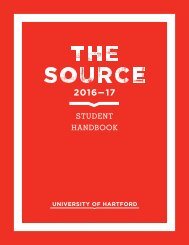advising
You also want an ePaper? Increase the reach of your titles
YUMPU automatically turns print PDFs into web optimized ePapers that Google loves.
ADVISING HANDBOOK FOR FIRST-YEAR STUDENTS<br />
Drama<br />
DRA 160 Introduction to Theatre [3]<br />
Study of theatre as a collaborative art form and as a means of<br />
expressing values. Attention is centered on various aspects of<br />
theatrical art: acting, directing, design, criticism, playwriting,<br />
audience involvement. Class work may involve play reading, lectures,<br />
discussions, and participation in and attendance at productions.<br />
DRA 170 Acting I [3]<br />
This course is for beginning-level students who want to develop<br />
their acting skills through theatre games, improvisation, scene,<br />
and monologue work. Students gain a practical understanding of<br />
fundamental concepts of acting technique, including objective, action,<br />
given circumstance, and focus. Other topics include body awareness<br />
and vocal quality, which help develop skill and self-confidence in<br />
public speaking situations. The course culminates in performances of<br />
selected scenes and monologues.<br />
Economics<br />
EC 101 Introduction to Economics [3]<br />
An introduction to the study of economics and its applications to<br />
issues such as budget deficit, tax policy, inflation, unemployment, and<br />
international trade. The course also applies economics to issues such<br />
as health care, poverty, and crime. The course may not be taken for<br />
credit by Barney students or A&S economics majors.<br />
EC 110 Principles of Macroeconomics [3]<br />
This course introduces students to macroeconomic theory<br />
relating to the collective economic roles of consumers, businesses,<br />
and governments. Topics include national income accounting,<br />
unemployment, inflation, the business cycle, fiscal and monetary<br />
policy, banking, economic growth, and international trade.<br />
EC 211 Principles of Microeconomics [3]<br />
This is an introductory course in microeconomic theory. Students<br />
learn basic principles of economic decision making from the<br />
perspectives of the individual, firm, and industry. Particular attention<br />
is given to the market system and how prices and profits coordinate<br />
the actions of economic decision makers. Topics include demand and<br />
supply, consumer behavior, costs and production, market structure,<br />
market failure, regulation, poverty, and income distribution.<br />
English<br />
ENG 140 Introduction to Literature [3]<br />
Focusing on a set of literary readings different with each section<br />
of the course, students examine the nature of literary discourse,<br />
as well as perennial and contemporary issues, pleasures, and<br />
problems raised by the writing and reading of all literary texts.<br />
The course equips students to engage a variety of texts subsequently,<br />
in and out of courses, in literature and life.<br />
ENG 217 Survey of Postcolonial Writers [3]<br />
Student explore the central themes and concerns of postcolonial<br />
literature, including the psychological residue left by imperialism, the<br />
suppression and revival of imagination in colonialist/postcolonialist<br />
worlds, and the problems and advantages of cultural mixing.<br />
ENG 220-221 Survey of American Literature I and II<br />
[3 credits each]<br />
ENG 220 Surveys American literature from the colonial period to<br />
the Civil War, while ENG 221 surveys American literature from the<br />
Civil War to the present.<br />
ENG 223/AFS 223 Survey of African American Literature [3]<br />
Reading and discussion of selected poetry and prose, with special<br />
emphasis on the works of major figures, such as Ralph Ellison, James<br />
Baldwin, Toni Morrison, and Alice Walker.<br />
ENG 230-231 Survey of English Literature I and II [3 credits each]<br />
ENG 230 introduces students to writers of English literature from<br />
the Middle Ages through the Renaissance, while ENG 231 surveys<br />
English literature from the 18th century to the present.<br />
Environmental Studies<br />
BIO 130 Introduction to Environmental Science [4]<br />
This course introduces fundamental principles, concepts, and<br />
methodology of environmental science from and interdisciplinary<br />
approach. Both local and global environmental issues are explored<br />
from ecological, social, economic, and governmental policy<br />
perspectives. Students gain an understanding of the basic scientific<br />
methods, tools, and techniques needed to understand and analyze<br />
environmental issues, including population growth, water quality,<br />
air pollution, environmental toxicology, waste management, climate<br />
change, biodiversity, renewable energy, and sustainability. A two<br />
and one-half–hour laboratory each week is required in addition<br />
to the lecture. Students are required to make several field trips to<br />
environmental sites, conduct indoor and outdoor experiments, and<br />
write a term paper dealing with a current environmental issue. No<br />
prerequisite. Laboratory fee.<br />
ENV 110 Fundamentals of Environmental Studies [4]<br />
This survey course integrates humanistic, social science, and science<br />
perspectives on the environment. In a broad sense the course exposes<br />
students to different ways of seeing, constructing, and acting in<br />
relationship to the natural environment and its human and animal<br />
inhabitants. In the process students are introduced to perspectives on<br />
the environment from multiple disciplines. No prerequisite.<br />
Gender Studies<br />
GS 100 Introduction to Gender Studies [3]<br />
This course explores a range of theoretical approaches to the<br />
study of gender, laying the foundation for a minor in gender studies.<br />
Students examine and critically analyze gender theory and its<br />
sources. The course approaches gender as a fundamental category<br />
of analysis, with careful attention paid to the intersection of race<br />
and class. Its emphasis on theory that is anchored in both the<br />
humanities and the social sciences prepares students for subsequent<br />
gender studies courses, including those exploring the most recent<br />
scholarship coming out of queer theory, masculinity, and sexualities.<br />
History<br />
HIS 100 Civilization since 1500: Making the World Modern [3]<br />
A study of the changing human experience with civilization during<br />
the formation of the modern world: the dynamics of economic,<br />
intellectual, political, and social modernization, and the dissolution<br />
20



